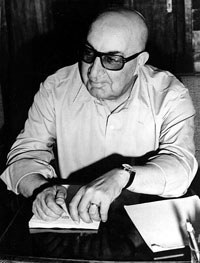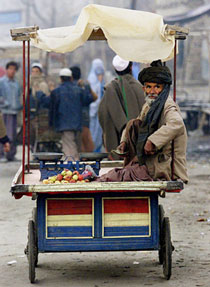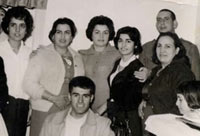



| Extra: See a slideshow of Kashifi's family. |
Afghanistan: David Kashifi
by Kechia Smith-Gran and Brandon Sprague
 |
| David Kashifi |
|
|
In 1978, when David
Kashifi was an 8-year-old living in Kabul, he heard the sounds that changed
his life forever. They were the sounds of Soviet-built MIG fighters roaring
overhead as the jets started bombing and strafing key government installments
throughout the Afghan capital. The attack by the planes, flown by communist
rebels, marked the beginning of the Saour (Afghani for ‘April') Revolution.
Although the revolution took less than two days, it triggered a larger
civil war that only ended with the overthrow of the Taliban regime in
December — almost 24 years later.
Young Kashifi was scared, probably because he knew what was going on.
Many of his mother's relatives were key members of the government that
was now under attack. His father had recently retired from a top position
in the military. As the bombing continued, his father took Kashifi his
mother and his three siblings to stay with their aunt in a village outside
Kabul.
"However, one thing we didn't anticipate was that the army base
that my father used to work at, called Karhan, was having a battle with
another army base on the other side of the village," said Kashifi,
pointing out that the second base had fallen to the rebel communists.
"Unknowingly we got caught in the crossfire."
So the family fled again, taking a bus that was full of refugees to another town where a friend of Kashifi's aunt lived. While they were having dinner, Kashifi excused himself to go to the bathroom.
 |
| Sardar Mohammed
Daoud, who took control of Afghanistan in 1973, was ousted five years later in a communist coup. (AP Photo) |
Kashifi's prediction |
Once locked inside, he turned to see a portrait of the beleaguered president, Muhammad Daoud, on the wall. The eight-year-old told the portrait that he was sorry, but he wouldn't be around much longer. Listen to Kashifi's prediction.
Kashifi was right. Later, he was playing outside with his brother when
saw something extraordinary: The Darul Aman Palace, which housed the government's
defense ministry in Kabul, was on fire 20 miles away.
"As I climbed on top of this wall and was staring at it, I saw the
whole building explode," Kashifi said. "The fireball was probably
like a mile up in the air. It was huge."
The destruction of Darul Aman marked the end of the revolution, which
lasted two days. As Kashifi predicted, Daoud, the president of the Afghanistan
republic, was already dead, killed in the presidential palace by the communist
rebels. That night Kashifi remembers listening to them announce that the
country had been liberated from its dictators.
But those two traumatic days and the ensuing months his father planned
the family's escape into Pakistan are not what Kashifi, now 32, likes
to remember about his homeland.
His cherished memories are of a dreamlike place, full of colorful bazaars, holy sites and hidden treasures of the ancient land that his grandfather took him to – against the wishes of his protective mother.
His grandfather, who never drove a car, took young Kashifi on a back
streets tour of the sacred city of Kandahar, where the "real Afghans"
lived. There he showed him the cloth worn by the Prophet Mohammed himself
on display in the Grand Mosque. (It was the same cloth Taliban leader
Mohammed Omar waved to insight his followers to battle in their final
push to take Kabul in 1996.) Listen to Kashifi's backstreet adventures
with his grandfather.
 |
| The Darul Aman Palace, built at the turn of the 19th century, was destroyed in the communist coup d'etat in 1978. (AP Photo) |
Kashifi remembers keenly his first crush, a girl named Hila who went
to his school. At the prompting of friends, he had brought a present for
her and waited for her outside the school in order to give it to her.
But then the school bell rang and he lost his nerve before she arrived.
"From that day on, I thought about her every day until I left Afghanistan
and even afterwards I still wondered what happened to her," he said.
"I used to imagine that she would just talk to me, that's all I wanted
to do. But then the war happened, everything just got shattered, we left
everything behind."
 |
| A man sells
apples at a bazaar in the Afghan capital of Kabul. (AP photo) |
Kashifi recollects his backstreet adventures . |
Still, Kashifi says he and his family were lucky. His father, had he
stayed in the military, would have perished in the communist coup along
with his former colleagues and friends. His mother's family, which was
very well-to-do and high up in the overthrown government, were also under
suspicion. But soon after the coup, Kashifi's parents managed to get visas
and passports for a holiday trip to India. No such trip, of course, took
place. The Kashifis left Afghanistan forever.
 |
| Most of the Kashifi family now lives in the United States. (Photo courtesy of David Kashifi) |
Flight The Kashifis' flight from Afghanistan. |
But nearly 25 years later, Kashifi, partly driven by the bittersweet
childhood images, frozen in time, of his grandfather, of young Hila, and
others, is planning to return to the country of his home this summer.
He wants to go see his old school, his folks' summer place in Jalahabad
and the other places of his youth that he remembers. Now a civil engineer,
Kashifi also plans to go to the nascent government under Hamid Karzai
and offer his services in managing some large-scale projects to help rebuild
the country's damaged infrastructure
Kashifi, who lives in Concord, is one of 60,000 Afghan Americans in the
Bay Area. In 1978, many of the Afghan professionals – doctors, engineers,
politicians, teachers, military officers like his father -- were forced
to flee under the communist regime which targeted the educated classes.
Now, Kashifi says, it's time to go home.
"Now there is this opportunity, and the world wants to help, it
takes a lot of Afghans to go there and step forward," he says. "They
should be the first in line to go and help out because … they know
their culture and have a passion for their country."
Kashifi says rebuilding may take 10 to 20 years but it will eventually
happen. One thing about Afghans, he says, is they don't quit.
Afghans have a 2,300-year history of not quitting. They didn't quit when Alexander the Great tried to invade in 300 B.C.E. Nor when Ghengis Khan came in the 13th Century or when the British Empire invaded in the 1800s. And they didn't quit when the U.S.S.R. invaded Afghanistan in 1979 -- shortly after Kashifi and his family got safely out of Kabul. Even though over a million Afghans died in the decade-long war that ensued, they resisted.
"Fortunately for the Afghans, they got some help from the West and
were able to fight back, but you know in the end it was their blood, their
passion, it was their love of their country, their love of freedom that
won the day."
